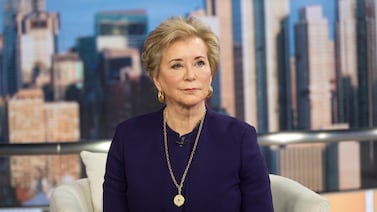Sign up for Chalkbeat Indiana’s free daily newsletter to keep up with Indianapolis Public Schools, Marion County’s township districts, and statewide education news.
Attorney General Todd Rokita’s office said Friday it will not remove materials from a website it launched earlier this week publicizing complaints about schools’ materials on race, gender and politics.
The office said it would, however, post responses from school districts challenging the validity of those complaints. But in order to dispute the materials, Rokita’s office told districts they had to prove the materials were not used by or made available in their schools.
Rokita’s “Eyes on Education” portal aims to compile and display complaints about “potentially inappropriate” material in schools that are “real examples of socialist indoctrination from classrooms across the state,” along with the purported material.
Districts responded by challenging the veracity of the materials labeled as theirs, saying the site’s characterizations of the content were inaccurate or misleading. Some of the posted material dates back to 2018.
The website’s launch triggered the latest confrontation between the state attorney general and schools over how educators handle controversial social and political topics, a fight also taken up by state lawmakers.
A spokesperson for Rokita’s office said the materials on the portal support the premise that there has been “indoctrination” in Indiana’s schools, even if policies have changed. Others, however, say it could have a chilling effect on teachers and schools.
The portal, which launched Tuesday, names 13 school districts and one university, and includes complaints with links to photos, screenshots, or presentation materials.
Rokita’s office said what’s posted are “exact documents provided to our office” and many were “from teachers directly and were easily verified.” A spokesperson said the office will reach out to those who submitted to the portal as well as schools if necessary. However, a vast majority of the districts on the portal previously told Chalkbeat that they were not asked in advance about the portal materials.
Rokita’s office also said it will conduct investigations to see if schools are breaking any state laws by using those materials. A spokesperson added that the portal is a tool for parents to “stop indoctrination more quickly and can ensure bad history doesn’t repeat itself in districts where such policies are claimed to be retired.”
Districts ask for updates to ‘Eyes on Education’
Multiple districts have asked Rokita for updates or changes. Four districts each shared with Chalkbeat the same email response to their concerns from the Rokita’s office that set a high bar to dispute the posted materials.
“Please provide documentation that the contents are not, or were not, provided to a student, communicated to a student or parent, or part of any curriculum, program, or activity made available to the school community by a teacher, school district, or school corporation,” the email from Corrine L. Youngs, policy director and legislative counsel in Rokita’s office, reads.
It also says that if the materials contain something that is outdated, the district needs to provide documentation that it was repealed or no longer used, as well as the new policy.
But the office will not remove materials in the portal, a spokesperson for Rokita’s office said Friday, adding that the complaints from schools indicated that the material had once been taught, even if it had subsequently been removed or updated.
Having the complaints and the districts’ responses on the portal “will actually help teachers and school administrators because it will expose misinformation that can naturally exist amongst the public,” the spokesperson argued.
As of Friday evening, the portal had been updated for two districts. It now labels a “gender policy” from Clark-Pleasant Community School Corporation as “retired” in 2023 and says a gender support plan from New Prairie United School Corporation was revised in November 2022.
Power of Rokita’s office may leave schools stranded
The spokesperson for Rokita’s office pointed to the previous outcry over critical race theory in schools and said the portal supported Rokita’s position.
“The types of people complaining now are the same ones who said there was no indoctrination going on in Indiana schools at all,” the spokesperson said. “Now these same types are saying – ‘well, the items on the Portal are no LONGER being taught, or we fired that teacher, or we fired that vendor, or we retired that policy.’ They just proved our point and elevated even further the value of the office in education matters.”
A legal theory, critical race theory has become an umbrella term for discussions of race and identity.
And there’s likely little recourse for schools unhappy with what Rokita’s done, one expert said.
The power of the attorney general’s office has increased over the years. Many attorneys general have gone on to run for higher office, which can incentivize partisan actions, said Michael Wolf, acting director of the Mike Downs Center for Indiana Politics at Purdue University.
Wolf added that as elected officials, attorneys general have wide latitude to act and little oversight. A governor does not oversee an elected attorney general’s office, for example (Rokita was elected to his office in 2020). And the Indiana Department of Education, which also has no authority over Rokita, said it is not involved with the portal.
Plus, Wolf said the portal could fall under the scope of the attorney general’s responsibility to advise other government officials, like those at the state education department or local prosecutors, who could then take action.
Aleksandra Appleton covers Indiana education policy and writes about K-12 schools across the state. Contact her at aappleton@chalkbeat.org.
MJ Slaby oversees Chalkbeat Indiana’s coverage as bureau chief. She also covers access to higher education and Warren Township Schools. Contact MJ at mslaby@chalkbeat.org.







